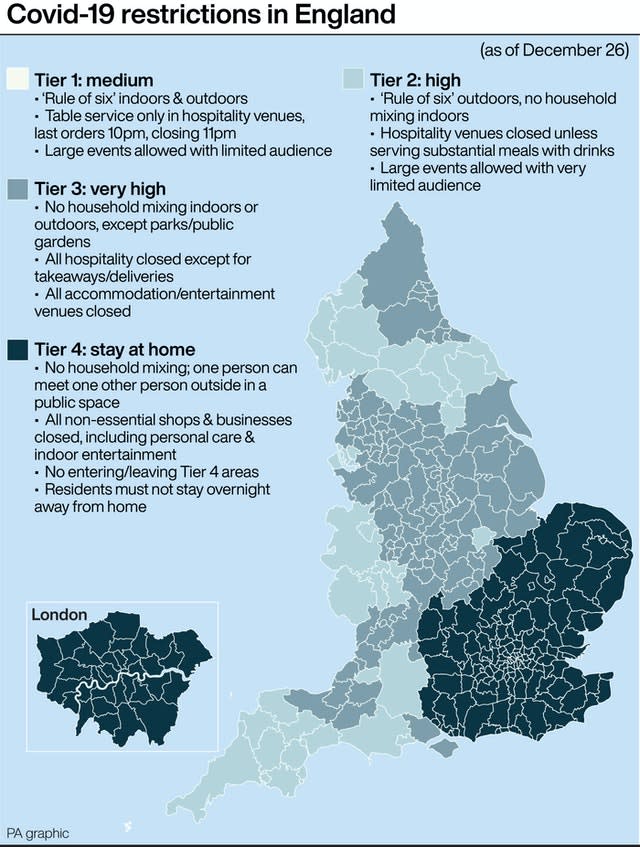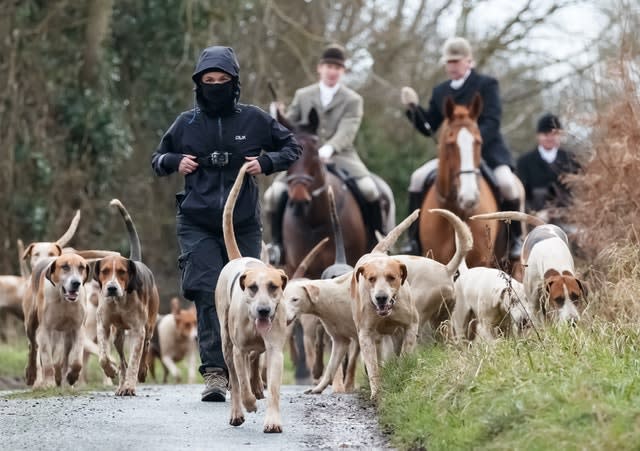Empty streets on Boxing Day as tougher Covid-19 rules imposed across UK
City centres were deserted in parts of the UK on Boxing Day as millions more people adjusted to strict new coronavirus restrictions and tens of thousands more cases were recorded.
Boxing Day sales looked to have suffered a sharp decline after Tier 4 measures came into effect on Saturday in large parts of England, with people ordered to “stay at home”.
New lockdown measures also came into effect in Scotland and Northern Ireland, forcing non-essential shops to shut, while restrictions were reimposed in Wales on Saturday after they were eased for Christmas Day.
By midday, footfall was down 60% across the UK compared with last year, according to retail experts Springboard, and shoppers are expected to spend £1 billion less.
However, shoppers in lower tier zones queued for bargains in the early hours of the morning, with around 200 people waiting in a socially-distanced queue by 5.50am outside Next in Leicester, which is under Tier 3 restrictions.

It comes as the Government announced a further 210 people died within 28 days of testing positive for the virus as of Boxing Day, while there were a further 34,693 lab-confirmed cases of coronavirus in the UK.
Meanwhile, congestion continued to ease at the Port of Dover and Eurotunnel on Boxing Day after thousands of drivers spent spent Christmas Day stuck in nearly a week-long of queues.

Transport Secretary Grant Shapps said 15,000 lorry drivers had been tested for coronavirus by midday on Saturday, and the backlog at the testing site at Manston Airport had cleared.
Elsewhere, a small number of Boxing Day hunts went ahead, with the centuries-old activity seeing reduced participation and town centre parades cancelled on Saturday.
However, it drew some criticism for going ahead, with Labour decrying the decision as “one rule for the Conservatives and their mates, another for everybody else”.

More than six million people in east and south-east England went into the highest level of restrictions, which now affects 24 million people representing 43% of the population.
Areas that moved to Tier 4 are Sussex, Oxfordshire, Suffolk, Norfolk and Cambridgeshire, parts of Essex not yet in the highest tier, Waverley in Surrey and Hampshire, with the exception of the New Forest.
The new measures are being imposed against a backdrop of increasing infections, hospital admissions and a new more contagious variant in the UK which was announced last week, which prompted global travel restrictions.

The new variant has reportedly been detected in other European countries, including Spain and Sweden, while French authorities confirmed a French man in Tours who lives in England tested positive on December 21 and is isolating.
The first shipments of coronavirus vaccines arrived across the European Union, including in Ireland where they were welcomed as a “great hope”.
Tier 4 restrictions include a warning to stay at home, a limit on household mixing to two people outdoors and force the closure of many shops, hairdressers and gyms.
The measures come on top of Tier 3 restrictions such as the closure of pubs and restaurants except for takeaways and deliveries.
Bristol, Gloucestershire, Somerset including the North Somerset council area, Swindon, the Isle of Wight, the New Forest and Northamptonshire, as well as Cheshire and Warrington, were moved to Tier 3, while Cornwall and Herefordshire moved from Tier 1 to Tier 2.
⚠️Today several areas in England move into higher tiers.
Check what tier your area is in: https://t.co/pans7Xgktl pic.twitter.com/zttHVSqFVy
— Department of Health and Social Care (@DHSCgovuk) December 26, 2020
Mainland Scotland entered Level 4 restrictions from Saturday, with the Scottish Government intending the increased measures to last for three weeks.
In Northern Ireland, the first week measures are the toughest yet, with a form of curfew in operation from 8pm, shops closed from that time and all indoor and outdoor gatherings prohibited until 6am.
Non-essential retail will close throughout the next six weeks, as will close-contact services, while hospitality outlets will be limited to takeaway services.

 Yahoo News
Yahoo News 














